Jim Powell, the longtime IUPUI professor and founder of The Indiana Writers Center, has published a book of short stories with a very fitting title: Only Witness.
That is the true calling of the writer – to be a witness to the people and the world around him or her – not to judge, not to praise or condemn or flatter or berate –only witness. It is a noble calling and Powell serves it well.
One of my favorite stories in the collection is “Night Train to Vienna,” in which a woman is with a man who doesn’t really see her, doesn’t see that she has needs of her own, but seems to feel her job is to fill his needs (sound familiar?) They are sharing a tiny room on a train with two bunks.
“They had become so. . .static, their boundaries, like the two bunks in the same room but unaligned.”
By chance she encounters a dark man who gives a greeting in Arabic; it’s obvious he is a refugee and she helps him avert a confrontation with police at a border crossing. At another stop, police escort him from the train. The woman feels a kinship with the man, and hoping for his escape, she begins to imagine her own escape from an unfulfilling relationship.
“Her chance buy valium online ireland would come.”
The story is so nuanced, so layered with meaning, it has the feel and weight of a condensed novel.
Powell gives us swift, telling portraits of a range of men, women and children, as they balance lives in the midwest, make brief escapes to try to lose their familiar selves in Mexico or Europe; a son contends delicately with a mother losing ground to dementia, a woman returns from California to pit old boyfriends against one another in an Indiana bar, a married couple tries to negotiate “the middle of the journey” of their married life.
Most of all, I treasure “Tigerville” – not a place, but a state of mind and heart, where a man comes to settle himself in the newly-found territory of life with a woman and her cats, her presence. The story teller watches her “puzzling over words at her desk, leaning back in the chair she chose for its uncomfortable uprightness. You wonder at her focus, her distance. She is near, but her self-absorption is power. . .”
Reading this quiet, attentive story, I think of the poet Mary Oliver’s line “I don’t know how to pray, but I know how to pay attention.”
In these true, insightful stories, Jim Powell knows how to pay attention.


No comments yet.